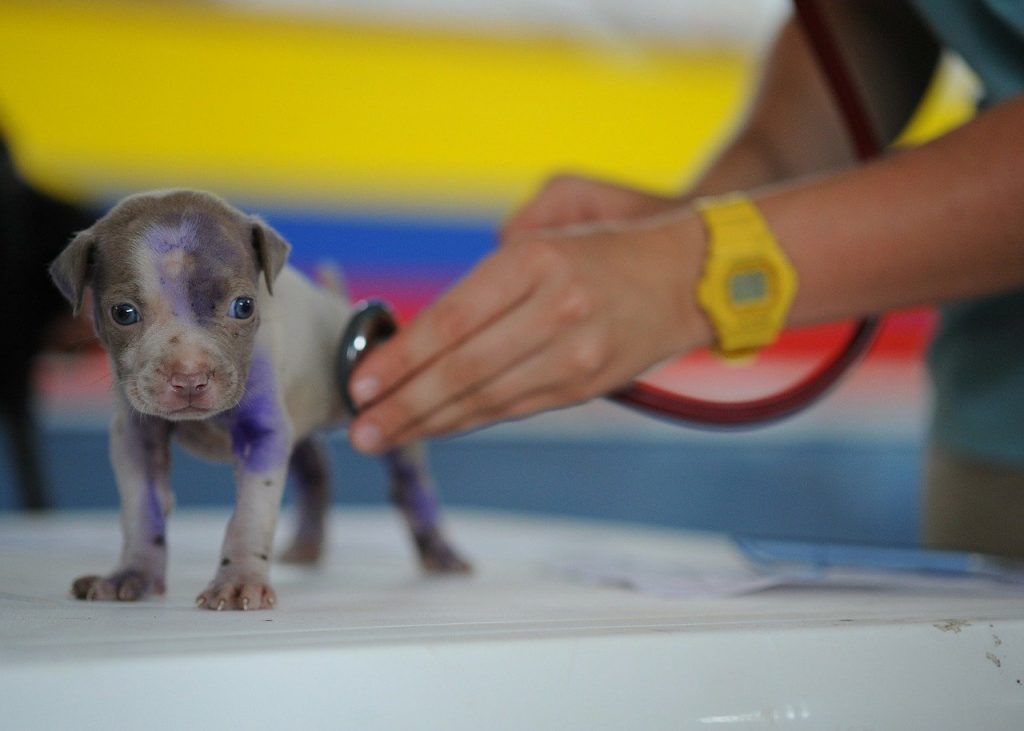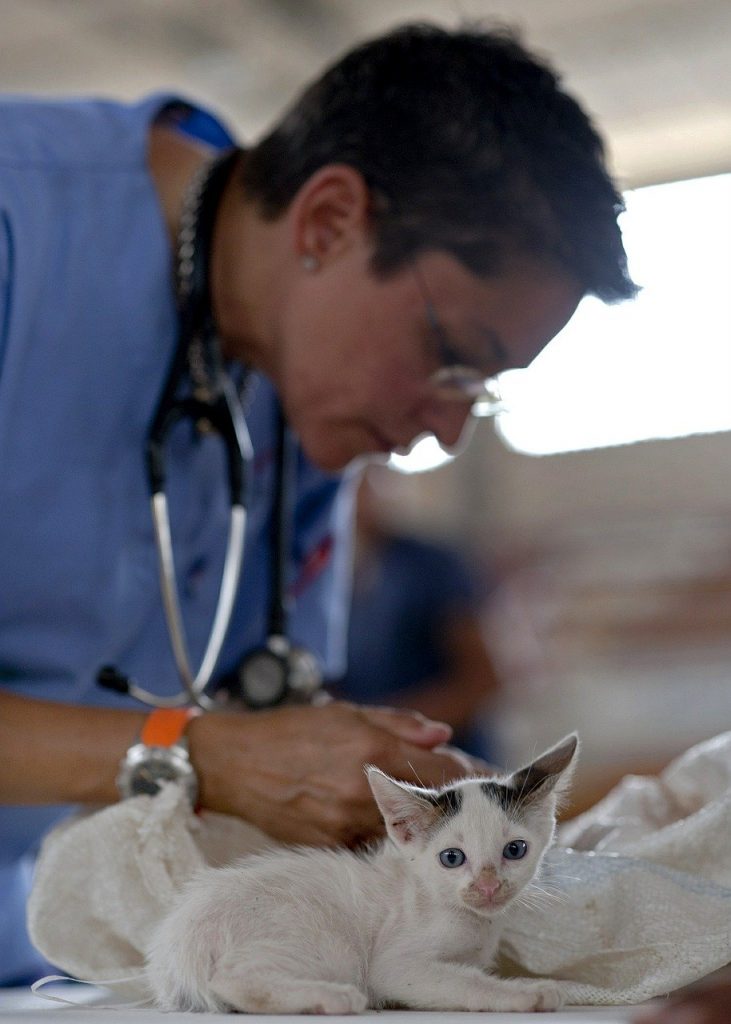Veterinarians are responsible for the health care of animals.
They are the doctors that diagnose, treat, and research any medical conditions that might affect livestock, pets, wildlife, and any other animal on the planet.
The job of a veterinarian covers more specialization than human doctors.
Considering the environment the vets work in, they need a range of certain qualities and traits to do the job.
They need compassion, decision-making skills, quick thinking, and also a strong stomach.
Of course, the love for animals is a significant advantage as well.
Article Table of Contents
What does a Veterinarian Do
The responsibilities and other aspects of the veterinarian’s job are pretty straight-forward.
They are similar to the duties of doctors, without some legal obligations.
Vets usually have to examine, diagnose, and treat animals.
They may have to perform a surgery, vaccinate them against diseases, use various medical equipment, and ultimately euthanize animals if they believe this is what has to be done.
Responsibilities
Of course, veterinarians can choose various specializations just like human doctors.
Specialization is an important factor for the vet job, as it’s impossible to get the knowledge to cover many areas at once.
While various types of vets have their own responsibilities respectively to the specialization, some duties overlap and are common for all vets in the field.
So, whether they work as assistants or doctors with a Ph.D. in the marine mammal field, the responsibilities usually include:
- Examine various animals.
- Find a diagnosis and recommend treatment.
- Treat and cover any types of wounds.
- Examine animals for diseases.
- Vaccinate animals against diseases.
- Use medical equipment such as X-ray machines, MRIs, etc.
- Give advice to animal owners on the best care of their pets.
- Prescribe medication to treat livestock or pets.
- Euthanize animals if they see fit.
Essential Skills
Compassion:
Vets need a great deal of compassion toward pets and their owners.
Strong stomach:
Vets often have to deal with severe cases or perform surgeries as well as draw blood.
Therefore, they should keep their cool in these instances.
Dexterity:
Veterinarians have to work with both large and small animals performing precise tasks, so they need great dexterity.
Quick reflexes:
Some pets the vets treat may be in a life-threatening situation.
They need quick reflexes and reactions to save their patients.
Decisiveness:
Vets should recommend the treatment course.
They should prove their decisiveness and be confident in their experience.
Quick reaction under pressure:
Veterinarians, especially those operating on patients, should be able to react quickly and correctly under pressure.
Fondness for animals:
This may seem obvious, but fondness for animals is a mandatory requirement for veterinarians.
How to Become a Veterinarian
Veterinarians should take multiple courses to get their doctorate, which is mandatory for becoming a vet.
Training and Qualifications
There are some requirements that you should be aware of if you want to become a vet.
In the US, you need a doctorate of Veterinary Medicine degree and a similar one in Canada.
For obtaining one, you need to take some classes first.
The veterinarian industry is highly competitive as it is, so obtaining a position can be difficult.
Additionally, there are a lot of requirements without which you can’t be hired in the field.
The requirements are both personal and formal.
You can’t practice as a veterinarian without some particular qualities.
The formal requirements include:
- A Doctor of Veterinary Medicine degree at an accredited college.
- Three years of pre-veterinary courses.
- A bachelor’s degree (optional, but helps).
To enroll in a veterinarian doctorate program, you need three years of pre-veterinary courses before.
It can be in Chemistry, Biology, Physics, Genetics, Physiology, and Statistics.
Experience
The degree is enough for those who start working, but veterinarians can also start a 1-year internship program to gain experience.
This can be very useful for job interviews since the field is very competitive.
However, some do it to develop skills and gain more confidence.
A veterinary medicine program takes four years to complete and it includes clinical, lab, and classroom work.
Most people applying to the vet school go for a bachelor’s degree.
With the industry being so competitive, every single resource and file in the resume matters.
Aspiring veterinarians attend veterinarian medical colleges.
These colleges offer various courses that include:
- Zoology.
- Animal Science.
- Chemistry.
- Biology.
- Anatomy.
- Physiology.
- Microbiology.
Working Hours
For instance, if you only deal with research, you may have to work office hours.
The work in a clinic, though, may include work shifts, overtime, on-call days, and responding to emergencies.
Industries that pay the most include:
- Management of Companies and Enterprises – $130,430 per year, $62.71 per hour.
- Scientific Research and Development Services – $130,430 per year, $61.80 per hour.
- Management, Scientific, and Technical Consulting Services – $114,740 per year, $55.17 per hour.
- Drugs and Druggists’ Sundries Merchant Wholesalers – $102,220 per year, $49.15 per hour.
- Other Personal Services – $101,360 per year, $48.73 per hour.
Work Experience
Experience influences the salary and responsibilities of a vet greatly.
Work history with animals is mandatory in many animal clinics.
Some companies seeking employees for research positions won’t even consider candidates without a minimum of three years of work with animals.
Many clinics used to train their employees to help them acquire higher-paying positions.
However, with advancing technology, the tendency towards specialization is now bigger.
Salary
According to PayScale, vets earn $78,085 per year on average.
The salary ranges between $58,000 and $109,000.
It can depend on your skills and experience and the location where you work.
The skills that influence the pay the most include Medicine/Surgery, Internal Medicine, Animal Care, Emergency Medicine, Diagnosis and Treatment Planning.
Career Outlook
The employment rate for veterinarians is projected to grow by 12% by 2022.
This is almost at the same level as the other professions in the US.
More job openings will be available in private practices, which offer better hours and better pay.
Animal medicine is advancing at a similar rate to human medicine, and more people take their pets to veterinarians, so the animal healthcare industry will see more job openings.
Other projections show that the employment rate growth will be at 9% by 2024.
Three main activities which will require veterinarians include disease control, public health, and animal safety.
Conclusion
The veterinary field is highly competitive with excellent salary and numerous career paths.
The job of a vet is highly satisfying on both personal and professional levels.
Increased job competition only proves it.
The industry is constantly growing, so employment opportunities are very optimistic.


I am just wondering, asking for a friend, is compassion a requirement for a pet clinic or veterinarian?